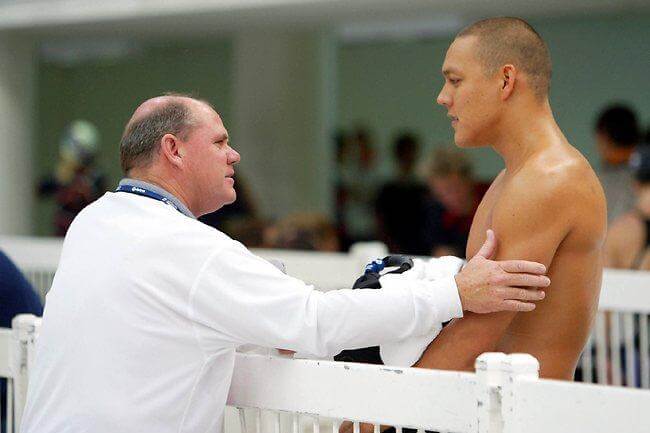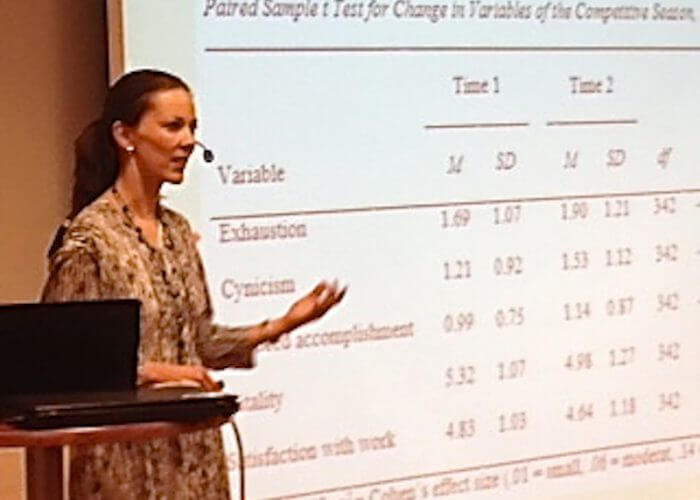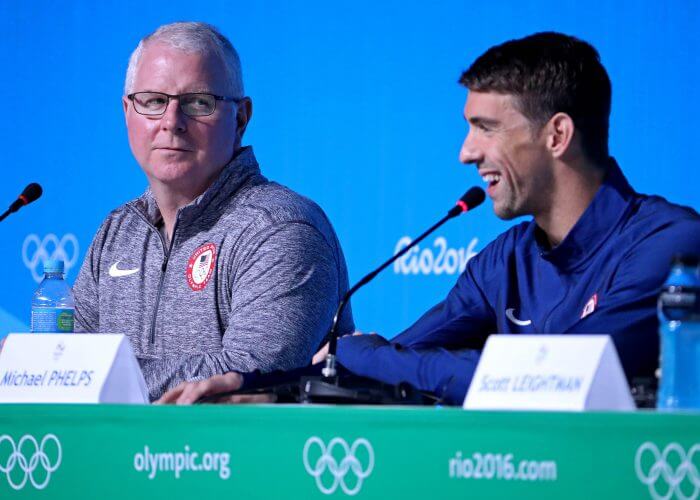Burnout On The Burning Deck: When Fatigue Flows To The Day Falling Down

Mental Health And Burnout: Coaches
Mental health issues are driving coaches out of sport, says Leigh Nugent, the respected former Australian Olympic head swimming coach and leadership figure. Ian Hanson’s report today highlights the #lookafteryourcoach initiative unveiled in Australia this week by the Brisbane-based M5 Management. It aims to promote mental well-being among coaches across all sports.
Athletes and staff are being asked to ask “How’s your mental health?” or “Where’s your head at today?” as part of their daily routines. Awareness counts.
A good moment to recall a presentation at the World Aquatic Development Conference in Lund, Sweden, back in 2014, when Marte Bentzen, of The Norwegian School of Sport Sciences, painted a stark picture of a condition that afflicts mentors in sport: Coach Burnout.
Here is the report written on the day for SwimVortex, courtesy of Craig Lord
From the Archive, January 2014: Coach Burnout
Olympic season. Lights, action, the world tunes in to singular moments of sporting excellence and achievement. Spills, thrills, smiles and tears – and when its done, the world moves on, swimming among those sports that slides back down the spectrum of media exposure.
Behind the scenes: burnout. No, not the swimmer – the coach. Followed by the risk of all things collapsing about the coach.
Behind the scenes: across the world this weekend, coaches will be steeped in work in training and at meets, long hours on the deck, travelling and coping with the load ahead of them. For many all will be well. For some, it will not. Anti-social moments ahead, as far as family life and the balance of all things go.
Wrecked lives in the community of coaches who get an honourable mention if their charge makes the podium and are either largely ignored if they find themselves celebrating best-ever performances that fall shy of the medals or pulped under the hammer of stinging criticism and loss of funding after a result in the realms of 4th to 8th.
The pressure is on but like the work that feeds into Olympic podiums, it starts long before the gun goes off at the Games.

Marte Bentzen of the Norwegian School of Sport Sciences – Photo Courtesy: Craig Lord
Addressing a room full of coaches at the World Aquatic Development Conference in Lund, Sweden, last month, assistant professor Marte Bentzen, of The Norwegian School of Sport Sciences, painted a stark picture of a condition that afflicts their number – Coach Burnout:
“Every fourth coach in top sport becomes fatigued during the season. An ailing privacy is one of many reasons why coaches lose motivation and passion.”
The Aftenposten spoke from true heart of the matter when it reported:
“Rowing’s national team manager Johan Flodin had a weird feeling in his stomach. He knew what awaited him when he opened the door to his own home after returning from the World Cup. When he peered into the empty apartment, he heard himself breathe and the gasp that followed. His family had flown – and taken the furniture.”
The coach sat on a new sofa for the interview but noted that the room where his two children had slept remains empty. The 48-year-old acknowledged that, in common with many others in his line of work, the job, the traveling, the unsociable hours, the sacrifice of private life had cost him his family and his personal happiness.
Bentzen, of the coaching and psychology department at the NIH, received her doctorate last October for a body of work that can only help improve the lot and understanding of coaches and the coaching role. Norwegian and Swedish colleagues followed 299 coaches from many sports in the two countries for the research, a very solid sample group.
In Lund, Bentzen explained to the coaches gathering that they have embraced a job in which they may experience a much greater conflict between work and life than those who work in realms that leave them less fatigued.
Fatigue is a trigger to a downward spiral
Fatigue is a trigger to a downward spiral, passion for the job a blessing and a curse. Her studies baed on workload and motivation, Bentzen suggests that while a coach remain enthusiastic about their jobs, they can – or at least appear to be able – to cope with the stress.
Bentzen displays slides that list some of the things that come with coaching: unpredictable; ever-changing; insecurity; intense pressure, highly competitive; unsocial; a wide spectrum of understanding in a given sport, including physiology, biomechanics, psychology, technology.
The study, identifying 182 stressors, found 24 different expert skills in the one job, a level well above that required in many other fields of work.
Those stressors came down to two overriding categories:
- performance-related – own and that of the athlete
- organisational stress – the environment in which they work; dealing with ‘leadership’, extensive travelling, limited delegation of responsibilities, internal conflicts, sports policies and lack of support.
“Who is looking after the coaches?” Bentzen asks. The issue and the welfare of coaches should be best compared to the emergency procedures on an aircraft which demand that you ‘put on your own oxygen mask before assisting others’. “If you do not look after yourself you will eventually not be able to help others,” says Bentzen.

Bob Bowman with Michael Phelps at Rio 2016 – Photo Courtesy: Peter Casey-USA TODAY Sports
This year (2014), Bob Bowman, mentor to Michael Phelps and others, will place his wisdom in the public domain in a book called The Golden Rules: 10 Steps to World-Class Excellence in Your Life and Work. Co-authored by Charles Butler and forwarded by Phelps, the book has many a gem in it.
Take this for season-end each year that speaks to the work Bentzen has been steeped in. “Over the years, I have become a firm believer in the value of celebration as part of the Method … in recent years I’ve started to celebrate the end of each year with a holiday party at my home …
“Achieving our dream vision requires plenty of sacrifice: we use hours we can never get back, we must propel ourselves through daily to-do lists, we need to find a way to fight through emotional and physical exhaustion. But once that moment of completion arrives, it’s imperative to stop, reflect, and consider what has been accomplished and discovered.”
“If you have found success … you have to revel in the spirit of achievement. If success has not found you, then still celebrate the road you have been on …”.
Bentzen’s work would appear to back up the value in those words.
One of the more surprising findings of the study was that feelings of burnout do not vanish if athletes perform well. “The studies did not find any statistical correlation between poor performance and fatigue in coaches,” says Bentzen, one of the qualitative studies she notes producing an interesting finding:
“Coaches with excellent results internationally can also experience burnout. We should stress that excellent results is no guarantee for a high level of wellness in coaches.”
It is not all dark, of course. Coaching comes with myriad opportunities inherent in teaching, interaction with young and talented people, personal development, a love of sport and the “joy and belongingness” of team.
Some call it family but for some coaches it comes at the expense of family.
Bentzen – her doctoral study entitled “Coaching Burnout in Top-level Sport” – and colleagues conducted four studies to investigate coach burnout in the elite world.
Concentrated on samples of coaches in Scandinavia, the finding that one in four coaches experience a “high level of fatigue” (a key symptom of burnout) at the end of each competitive season, is stark. Says Bentzen:
“This is a significant number and an issue sports organisations and coaching education programs need to address to make sure that coaches can remain in their jobs for a long time.”
Burnout – The Causes

The black line – Photo Courtesy: Andy Ross
Burnout is much more than simply feeling tired, notes Bentzen. Think creep, the gradual gnaw of things that pile up on a trajectory to falling down.
High levels of fatigue come hand in hand with blunted emotions and reduced performance, on the job and beyond it.
In swimming, coaches know well the stories of colleagues who look for all the world on the deck like masters of their one circumstance and art, drivers of success and discipline, when the reality back home is chaos, broken relationships, a ship heading for the rocks. Some turn it round, some never do, a few pay the ultimate price, suicide not unknown in coaching circles.
Coaches on the way to developing burnout syndrome experience negative symptoms both physically and mentally, says Bentzen. The downward spiral churns as the negativity extends beyond the individual coach to their athletes, programs and the organisation in which and for which they work. Where other professions may take to the water, the gym, the road and cycle track to escape work and reduce stress, that environment is not one the coach may perceive as ‘leisure and pleasure’: it is just a further opportunity for the mind to work on in the same realm.
Bentzen’s doctoral thesis consisted of four studies:
- A qualitative study involving in-depth interviews of four former top-level coaches on how they experienced the process and the job that lead to strong burnout symptoms.
- How changes in the working environment leads to changes in motivation which in turn leads to changes in level of burnout and wellness.
- Whether there are different developmental stages as coaches experience a high level of fatigue over the course of a season. This part also looks at the likelihood of being in these stages based on workload, issues in their personal life, rest and quality of motivation.
On the trail of four Norwegian top-level football coaches over a competitive season, with investigation of the differences in coaches experiencing mild or strong symptoms of burnout at the end of the year.
The Nature of Burnout
Burnout is linked to depression but is not the same, says Bentzen. Is burnout a problem – and why, she asks. The answers starts when we consider the causes.
Workload
On top of what is actually done, there is perceived workload and the work-home “interference” factor to consider (many studies conducted on the impact of work-home factors on women’s lives, but few on the lives of men and fewer still on coaches).
Self-determination

Joan Duda at the WADC in 2014 – Photo Courtesy: Craig Lord
Bentzen wanted to see if the self-determination theory could clarify the process of how an individual develops the burnout syndrome. She concludes: “The theory has helped to explain why a demanding and unsupportive working environment may lead to a higher degree of burnout in top-level coaches.”
The process model is fairly simple and sits on the following pillars:
- The work environment (the climate) – basic psychological needs – quality of motivation
- Basic psychological needs include the concepts of autonomy, competence and relatedness, the very factors that feed into related research, such as that of Prof. Joan Duda and what that tells us about cheating in sport and the precursors of doping.
- Quality of motivation hangs on two opposing pegs: autonomous; or controlled motivation. The latter is more likely to end in burnout.
Bentzen notes what’s missing in the interface between swim coaching and studies that tell us what constitutes a “healthy worker”: there are no specific projects among federations and those with the big budgets that identify and target those at risk’; there are no longitudinal studies that might tell us about the extent of the problem.
Self-determination Theory
The self-determination theory (SDT) is an empirically based theory on motivation, personal development and wellness. The theory focuses on different types of motivation, not level of motivation. The quality of motivation is key. More reading: Deci, E. L., & Ryan, R. M. (2008). Self-Determination Theory: A macrotheory of human motivation, development, and health. Canadian Psychology-Psychologie Canadienne, 49(3), 182-185. doi:10.1037/a0012801 and the Self Determination Theory website.
To maintain the mental energy required as a top-level coach, it is crucial for the working environment to support self-determination, challenge the coaches and allow them to apply their knowledge, say Bentzen and team. It is also important for the coaches to develop good working relationships.
If motivation is thwarted, through conflict with leaders and colleagues, for example, decline is far more likely to set in. The research findings showed that the degree of self-determined motivation (whether the job was perceived as fun, interesting and rewarding) is vital: it prevents burnout. Those who no longer loved their work were at far greater risk of burnout.
In Lund, Bentzen highlighted the cases of five coaches who quit sport and were lost to coaching. She concluded:
“If you go to work because you have to not because you want to, it is a red flag.”
Equally, the study indicated that those who “rejected rules and regulations” and those “chasing the money and fame” – the kind of profiles referred to as wearing “Ego Glasses” by Prof Joan Duda in Lund – were more likely to reach at point of exhaustion that would place them at risk of burnout. Those well versed with ways of “relaxing and detaching themselves” from the strains, stresses and tiredness of the working day could be viewed as at “low risk” of burnout.

Beer and burnout
Signs to watch for speak to work-life balance issues, such as:
- Maladaptive motivation
- High levels of work-home interference
- Difficulty in finding any method of recovering from a day’s work
- Turning to alcohol as a recovery strategy
- Difficulty in sleeping/turning off from the job
Among recommendations and measures that could help to prevent top-level coaches from being burnout, Bentzen and team suggest that coaches need to be educated on:
- how to organise their working hours
- how to set limits and how to maintain a healthy balance between their working
life and personal life - how they can care for their own well-being
- how they can maintain their energy levels through proper rest and recovery
Further, educational programs should prepare the coach for the organisational and administrative aspects of their profession. They should learn about leadership, decision-making processes, conflict management, how to delegate responsibilities and have a good general knowledge about how organisations work successfully.
Bentzen would like sports employers to provide more support that she believes is available. “The measures to improve the working conditions for the coaches should be adapted to accommodate the needs of the different sports,” she adds.
Frank Abrahamsen, head of the coaching education program at the Norwegian School of Sport Sciences, echoed that when he urged the Norwegian Olympic and Paralympic Committee and Confederation of Sports (NIF), schools and universities should include these findings in their educational programs.




Well written and researched Craig. Very relevant and important.
Thanks Gary. Great research by the Norwegian team and others. I hope coaches and those who employ them take note and use it to improve the lot of all in the coaching profession.